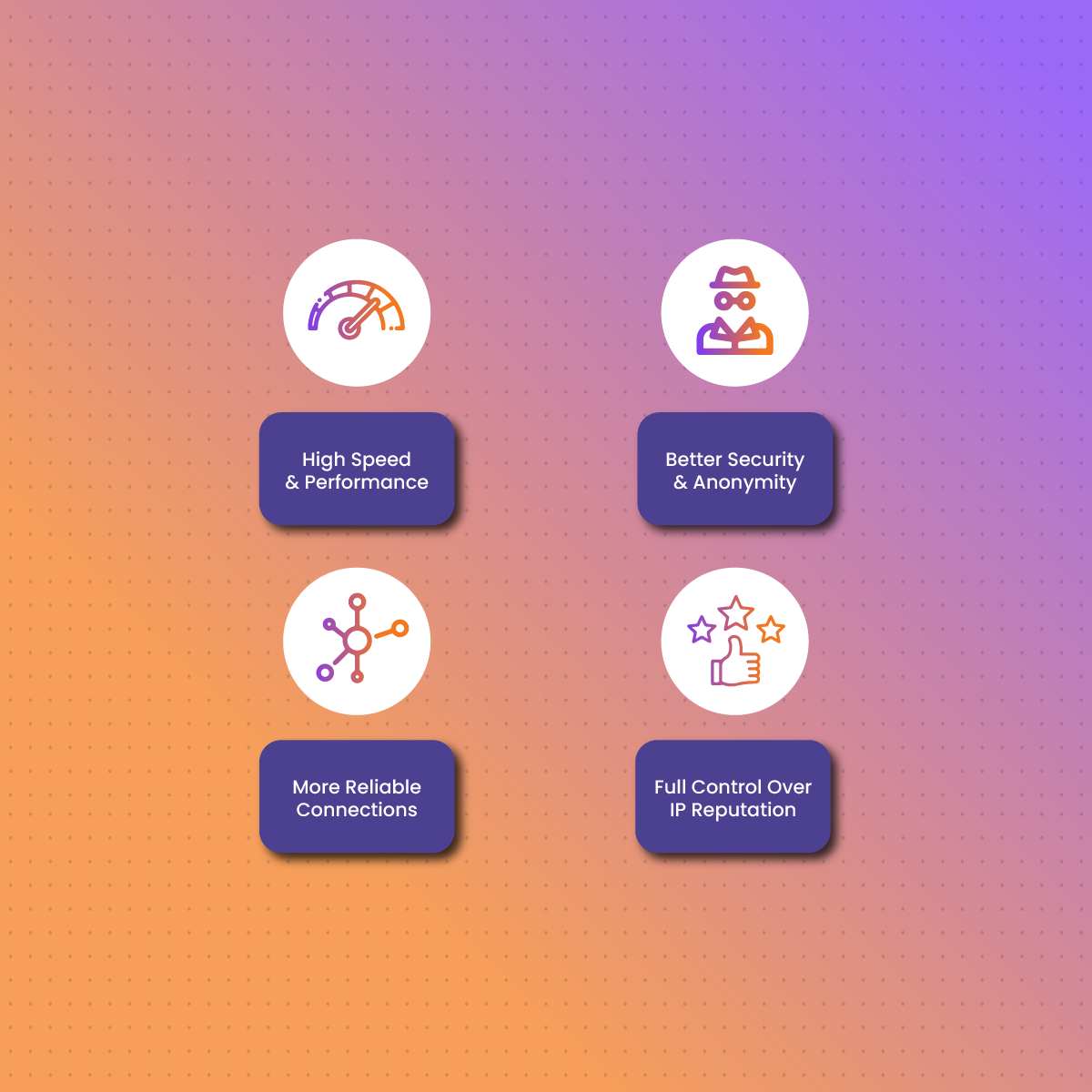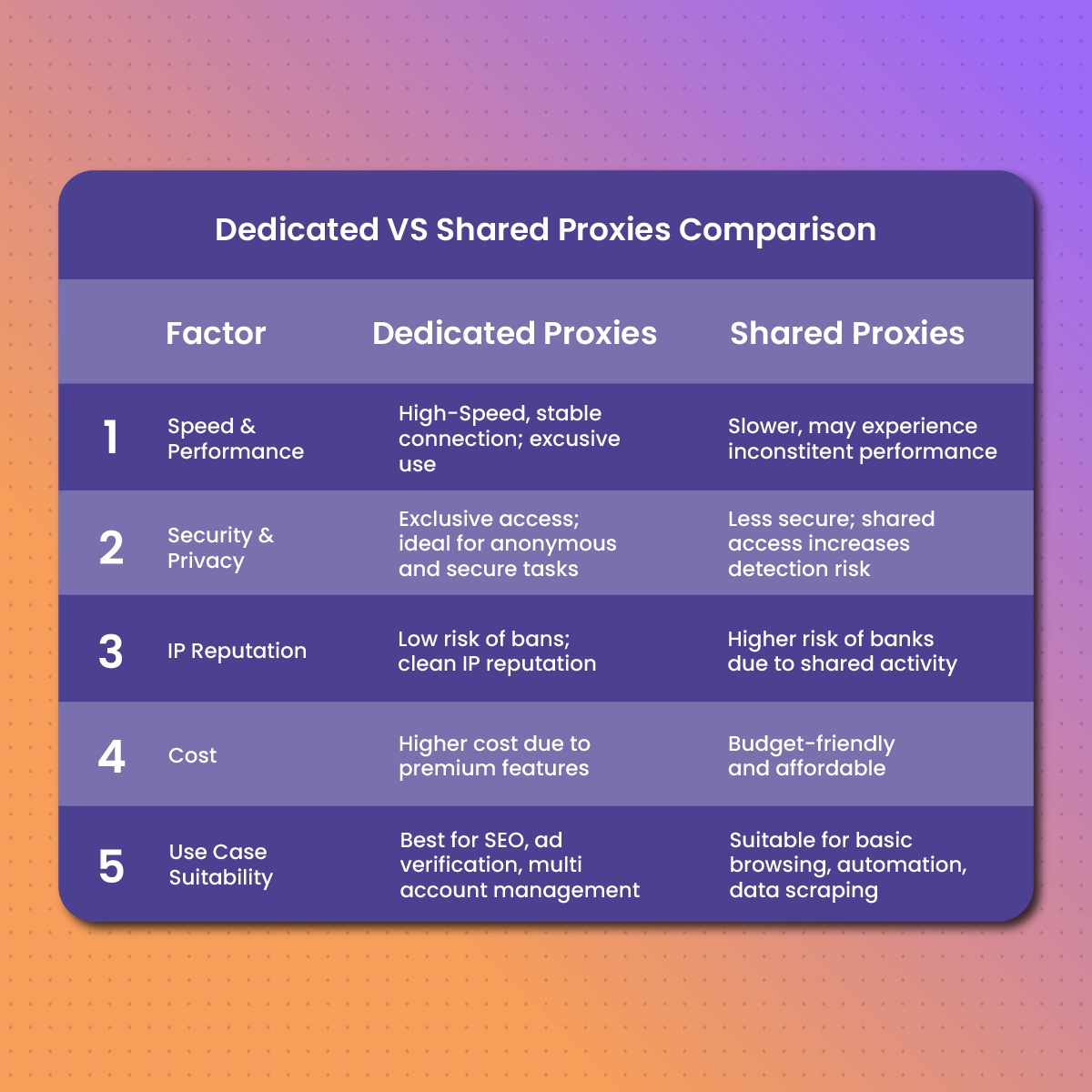Datacenter proxies are essential tools for businesses and individuals who need fast, anonymous, and scalable access to the internet. They are widely used for web scraping, cybersecurity, ad verification, and automation tasks. However, not all datacenter proxies function the same way. The two primary types—dedicated and shared datacenter proxies—offer different advantages, and choosing the right one depends on your specific needs, budget, and security requirements.
Dedicated proxies provide exclusive use of an IP address, ensuring high performance, security, and reliability. On the other hand, shared proxies are more cost-effective but involve multiple users sharing the same IP, which can lead to slower speeds and higher risks of detection.
This article explores the key differences between dedicated and shared datacenter proxies, their use cases, pros and cons, and which type is best suited for your needs. By the end, you’ll have a clear understanding of which proxy solution aligns with your business or personal internet activities—and how NetNut’s premium datacenter proxies offer the best combination of speed, security, and affordability.
What Are Dedicated Datacenter Proxies?
A dedicated datacenter proxy is an IP address assigned to a single user only. Unlike shared proxies, which multiple users can access at the same time, a dedicated proxy ensures full control, consistent performance, and enhanced security.
Key Benefits of Dedicated Datacenter Proxies
- High Speed & Performance – Since there is no competition for bandwidth, dedicated proxies offer faster response times and low latency, making them ideal for high-speed applications.
- Better Security & Anonymity – With no other users on the same IP, there’s a lower risk of detection, bans, or blacklisting.
- More Reliable Connections – A dedicated proxy ensures stable performance without slowdowns, even during peak usage.
- Full Control Over IP Reputation – Since you are the only user, your proxy’s IP reputation remains clean, reducing the risk of website bans.
Best Use Cases for Dedicated Datacenter Proxies
Dedicated proxies are ideal for:
- SEO monitoring & market research – Ensuring accurate, location-specific search results.
- Web scraping & automation – Running large-scale data extraction without triggering security blocks.
- Ad verification – Checking ad placements without detection.
- Cybersecurity & penetration testing – Safeguarding digital infrastructure.
- Managing multiple social media or e-commerce accounts – Preventing bans due to IP duplication.
While dedicated proxies provide superior performance and security, they are typically more expensive than shared proxies. If cost is a primary concern, shared proxies might be a better fit—though they come with trade-offs, which we’ll cover in the next section.
What Are Shared Datacenter Proxies?
A shared datacenter proxy is an IP address that is used by multiple users simultaneously. Unlike dedicated proxies, which provide exclusive access, shared proxies distribute their bandwidth across multiple users, making them a more cost-effective option for certain applications.
Key Benefits of Shared Datacenter Proxies
- Lower Cost – Shared proxies are significantly cheaper than dedicated proxies, making them a budget-friendly solution for users who don’t require exclusive access.
- Sufficient for Low-Intensity Tasks – For activities that don’t require high speeds or private access, shared proxies can still perform effectively.
- Easy to Access & Deploy – Shared proxies are often pre-configured and ready to use, requiring minimal setup.
Potential Drawbacks of Shared Datacenter Proxies
While shared proxies are cost-effective, they come with certain limitations:
- Slower Speeds – Since multiple users share the same IP, performance can fluctuate depending on traffic load.
- Higher Risk of IP Bans – If another user engages in suspicious activity, the entire IP can get flagged or blacklisted.
- Reduced Security & Anonymity – Because multiple users are operating on the same proxy, tracking and detection risks increase.
Best Use Cases for Shared Datacenter Proxies
Shared proxies work well for:
- Basic web scraping – Gathering publicly available data at a smaller scale.
- Price comparison tools – Checking pricing information from different locations.
- Accessing restricted content – Bypassing geo-restrictions on streaming services or websites.
- Casual anonymous browsing – Masking your IP for general internet privacy.
If speed, security, and reliability are top priorities, a dedicated proxy is the better choice. However, if cost savings and basic online anonymity are more important, shared proxies may be sufficient.
Key Differences Between Dedicated and Shared Datacenter Proxies
Dedicated and shared datacenter proxies serve different purposes, and understanding their differences can help you choose the best option for your needs.
One of the biggest distinctions is speed and performance. Dedicated proxies offer high-speed, stable connections since they are assigned to a single user. In contrast, shared proxies can experience slowdowns and inconsistent performance because multiple users are sharing the same IP address.
When it comes to security and privacy, dedicated proxies provide exclusive access, making them ideal for tasks that require anonymity and reliability. Shared proxies, on the other hand, lack privacy since multiple users operate on the same proxy, increasing the risk of detection and tracking.
Another key factor is IP reputation and risk of bans. Dedicated proxies have a low risk of being blacklisted because they are used by only one user, ensuring the IP remains clean. In contrast, shared proxies carry a higher risk of being flagged if another user engages in suspicious activities, which could result in access restrictions or CAPTCHAs.
Cost is another major difference. Dedicated proxies are more expensive because they offer better speed, security, and reliability. Shared proxies are more affordable, making them a budget-friendly option for casual browsing and basic web scraping.
Ultimately, dedicated proxies are best suited for high-security, high-performance tasks such as SEO monitoring, ad verification, and managing multiple accounts. Shared proxies work well for cost-conscious users who need proxies for basic automation, data collection, and general browsing.
Which Type of Datacenter Proxy Should You Choose?
Choosing between dedicated and shared datacenter proxies depends on your specific needs, budget, and the level of security required.
If speed, reliability, and security are your top priorities, then dedicated datacenter proxies are the best choice. Since you are the only user assigned to the proxy, there’s no risk of slowdowns caused by shared bandwidth or being affected by another user’s activities. This makes dedicated proxies ideal for tasks such as SEO monitoring, ad verification, large-scale web scraping, and managing multiple social media or e-commerce accounts. However, dedicated proxies come at a higher cost due to their exclusivity and premium performance.
On the other hand, if affordability is more important than speed and privacy, shared datacenter proxies may be a better fit. These proxies are significantly cheaper because multiple users share the same IP, making them a great option for light web scraping, price comparison tools, and general anonymous browsing. However, the downside is that performance may be inconsistent, and the risk of IP bans is higher if another user misuses the proxy.
For businesses or individuals who require high-security, uninterrupted access, and long-term stability, dedicated proxies are the superior option. However, if your needs are basic and budget-driven, shared proxies can still provide a functional solution.
No matter which type you choose, working with a reliable proxy provider is essential to ensure quality performance and minimal detection risks. In the next section, we’ll discuss why NetNut’s datacenter proxies offer the best balance of speed, security, and affordability.








